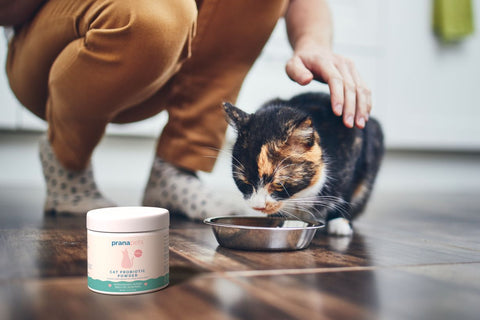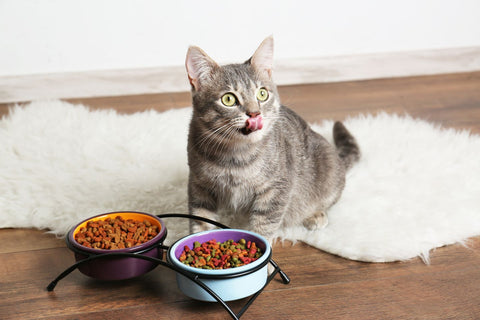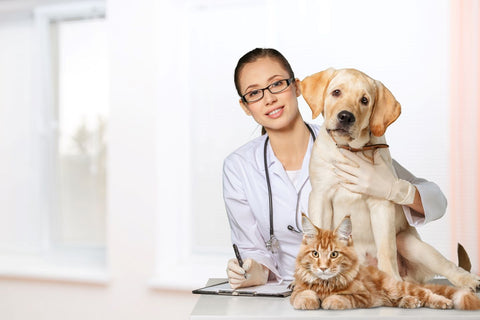

How Can You Tell If Your Cat Is Sick: Signs to Watch Out For
Key Highlights
- Cats are good at hiding when they are sick. This is why you need to pay close attention to their health.
- Changes in appetite, thirst, energy, or litter box habits can mean your cat is ill.
- Watch for physical signs like weight loss, hair loss, or discharge from the eyes or nose.
- Be aware of behavioral changes, too. Aggressiveness or being withdrawn are big warnings you should not ignore.
- If you think something is wrong, it is always safer to consult a veterinarian. Early detection can greatly help your cat's health.
Introduction
As a caring cat owner, you want to give your cat the best care possible. Early detection of health problems, especially in a sick cat, is important for helping your cat live a long and healthy life. But cats often hide their sickness, which can make it hard to see when a cat is not well. This guide will help you learn the subtle signs of illness in your feline friend. With this knowledge, you can act quickly and get veterinary care if needed.
Signs Your Cat May Be Sick: What to Watch Out For
Watching how your cat behaves each day and noticing any changes is the first step to understanding their health. Small changes may not be a big deal, but if there are serious or ongoing changes, especially with other signs, you should take your cat to the vet.
Keep in mind that cats are good at hiding their sickness. By paying attention to your cat's health, you can catch problems early. This gives your cat the best chance to recover quickly and live a long, healthy life.
1. Unusual Changes in Appetite or Thirst
One clear sign that something may be wrong with your cat’s health is a sudden change in how they eat. If your cat, who used to love their meals, starts to eat less or won’t eat at all, this is a concern. On the other hand, if your cat has a big appetite and is losing weight, this could indicate a health issue like hyperthyroidism, potentially leading to weight gain in the future.
You should also pay attention to how much fresh water your cat drinks. Cats usually don’t drink a lot of water, so any change in their water intake is important. If your cat begins drinking more water or shows less interest in it, this might hint at potential health issues, such as kidney disease.
It’s important to keep an eye on your cat’s eating and drinking habits. Noticing any big changes in these habits should prompt you to talk to a vet. Early detection is key to keeping your feline friend healthy.
articlebanners1
2. Altered Sleeping Patterns or Lethargy
Cats are well known for sleeping a lot. However, if you notice a sudden change in how much energy they have or how their energy level affects their sleep, it's important to pay attention. Lethargy, which means being very tired and less active, is often a sign that your cat may not be feeling good. If your normally playful cat seems really tired, sleeps more often, or lacks interest in their favorite games, it might mean there is a health issue.
While all cats enjoy a good nap, watch for big changes in their sleeping habits. If your cat sleeps much longer than usual and also shows other signs like a loss of appetite or changes in behavior, it may show that something is wrong and needs attention.
If you notice your cat acting lethargic or changing how they sleep, it's smart to make an appointment with your veterinarian. A thorough check-up can help find out why these changes are happening. It can also make sure that any health issues are taken care of quickly.
3. Sudden Aggression or Withdrawal
Cats like routine and often act in ways we expect. If your cat suddenly behaves differently, especially showing aggression when they usually do not, this might mean something is wrong. Cats can act aggressively for different reasons like being territorial or playful. However, if they show unexpected aggression toward you or other pets, it needs your attention.
Additionally, if a cat is in pain or discomfort, they may pull away from their usual social activities. They might seem less interested in being around you or their feline friends. If your once-friendly cat starts avoiding you, hiding often, or acting distant with their hind legs tucked away, it could be a sign they are feeling unwell.
Changes in your cat's behavior might be small but are important signs of health issues. Paying close attention to any sudden changes in how they act and getting veterinary help when necessary can greatly improve their well-being.
4. Changes in Grooming Behavior
Cats are known for their careful grooming habits. They spend a lot of time cleaning their fur and keeping it smooth. If you see subtle changes in how your cat grooms itself, it can mean there are health issues. For example, if your cat is over-grooming or licking its fur too much, it might have skin allergies, parasites, or stress.
On the other hand, if your cat is grooming less and looks messy, this could point to dental pain, joint issues, or other health problems that make it hard for them to groom. If you see a lot of hair loss, bald spots, or thinning fur, especially with dandruff, pay attention. These signs can show various health issues, from parasites to hormonal problems.
Watching how your cat grooms can give you clues about its health. It's important to notice changes and act quickly to help keep your feline friend happy and healthy.
articlebanners2
5. Persistent Coughing, Sneezing, or Breathing Difficulties
Just like people, cats can have breathing problems. It's important to spot the signs early to give them the right care. A rare sneeze or cough is normal, but if symptoms last, you should get help right away. If your cat has a cough that won’t go away, especially with gagging or vomiting, it might mean they have an upper respiratory infection, allergies, or something more serious like asthma or heartworm disease.
Frequent sneezing, especially with discharge from their eyes or nose, can also mean an upper respiratory infection or feline herpesvirus, which is common but can be serious. Additionally, observe for excessive drooling, as this can indicate underlying dental issues or other health concerns. Watch how your cat breathes. Fast or hard breathing, wheezing, or trouble catching their breath are all signs they need urgent care from a vet.
If you see any of these problems, don’t wait to seek help. Breathing issues in cats can get worse quickly. Getting timely help can make a big difference in their recovery.
6. Unexplained Weight Loss or Gain
Fluctuations in your cat's weight can be a sign of health issues. If your cat loses weight suddenly and does not change its diet or activity level, it could signal medical problems. These problems might include dental issues, diabetes, hyperthyroidism, or even cancer.
If your cat gains weight without changing its food or exercise, it may have a metabolic disorder or could just be eating too much. Obesity in cats can lead to health issues like diabetes, arthritis, and heart disease.
It's important to regularly check your cat's weight and notice any big changes. If you see your cat losing or gaining weight for no clear reason, it is best to take them to the veterinarian. This way, you can address any potential health concerns.
7. Changes in Using the Litter Box: Constipation and Diarrhea
Changes in your cat's litter box habits are important signs that you should not ignore. If you see your cat having trouble urinating, making noise in the litter box, or going to the box often with little or no urine, it might be a sign of Feline Lower Urinary Tract Disease (FLUTD). This issue mainly affects the bladder and urethra and can happen for different reasons like urinary tract infection, bladder stones, or idiopathic cystitis, which has unclear causes.
Also, if your cat is pooping less often and is straining, with small hard stools or blood in the feces, it may be a sign of constipation. While food choices and hairballs can cause constipation, it might also point to other health problems like dehydration, intestinal parasites, intestinal blockages, or even issues with the nervous system.
These conditions can cause discomfort and pain for your cat. If you wait too long to get help from the vet, the situation can get worse, especially with FLUTD, where blockages can be very dangerous if not treated. Therefore, it is very important to seek immediate veterinary care at the first sign of any litter box problems to keep your cat healthy and happy.
articlebanners3
8. Visible Discomfort or Pain: Vocalization, Posture
Cats are experts at hiding their pain. However, there are small signs you can look for that show your feline friend might be in discomfort. One clear sign is vocalization. Cats may meow for many reasons, but if your cat’s meowing increases and sounds distressed, urgent, or unusual, it could mean they are in pain or are seeking comfort like a mother cat with her kittens.
Another sign is their posture. A cat in pain might hunch their back, avoid jumping or moving, or seem stiff. If your cat is less active, like not wanting to play, groom, or interact with you or your family, this can also indicate they are experiencing pain.
If you notice these signs, don't just think it's normal behavior. It’s important to get veterinary advice soon to find out what's wrong. This way, you can help your cat feel better and ensure they get the care they need for a quick recovery.
9. Other Visible Signs: Vomiting, Discharge, Swelling
Vomiting, discharge, and swelling are other visible signs that your cat may be sick. Vomiting can be caused by various factors such as hairballs, dietary indiscretion, or underlying medical conditions. Persistent or severe vomiting requires immediate attention from a veterinarian to prevent dehydration and other complications.
Discharge from the eyes, nose, or ears can indicate infections or allergies. It's essential to monitor the type and color of the discharge as it can help your vet determine the underlying cause and provide appropriate treatment.
Swelling in any part of your cat's body, including your cat's gums, should not be ignored. It could be a sign of an injury, infection, abscess, or even a tumor. If you notice any abnormal swelling, especially if it's warm to the touch or tender, consult your veterinarian promptly for a thorough examination and treatment plan. Your cat's well-being is worth monitoring closely for any visible signs of illness or pain.
Conclusion
In conclusion, it is important to know the signs that your cat may be sick. Changes in appetite or behavior can show that your feline friend is not feeling well. Staying alert can help you find health problems early. Regular visits to the vet and quick action if you see anything unusual are key to keeping your cat healthy. Remember, your feline relies on you to get the right care. If you notice any signs that concern you, do not wait. Seek advice from a vet to keep your furry friend happy and healthy.
Frequently Asked Questions
How often should I take my kitty to the vet?
Annual vet check-ups are very important for cats of any age. They help find health problems early, like kidney disease and dental disease. It is also necessary to keep their vaccinations up to date. Older cats might need to see the vet more often, ideally two times a year.
Do indoor cats get sick less often than outdoor cats?
Indoor cats may face fewer dangers than outdoor cats, but they can still become ill. It is important for indoor cats to have flea control and protection from parasites. Keeping a safe and engaging indoor space and taking them to the vet regularly are key for their health.
What should I do if I notice signs a cat is ill?
If you think your cat is sick, call your veterinarian right away. Early detection is very important for treating your cat well. Your veterinarian can look at the problem, give a diagnosis, and make a treatment plan. This plan may also include emergency care if it's necessary.
How can you tell if your cat is sick by changes in behavior?
Behavior changes in cats can be subtle signs of illness. You should watch your cat's body language, appetite, and litter box habits closely. Some changes might happen because of stress or changes in their environment. However, it is important to visit the vet to rule out any medical issues.
articlebanners4




